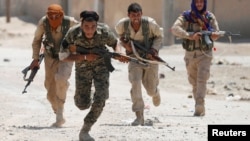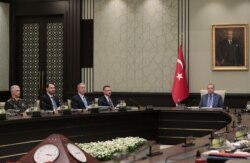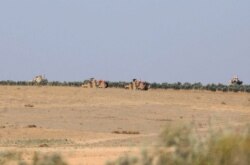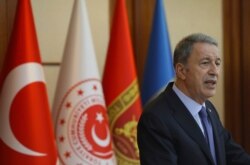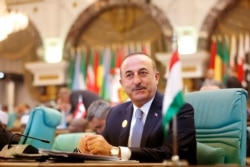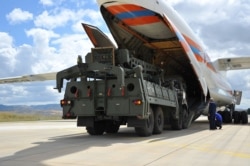Turkey's National Security Council met Tuesday to decide whether to launch a military offensive into Syria against the YPG Kurdish militia.
With Washington backing the YPG and warning against any unilateral action, the two NATO allies could be on a collision course.
President Recep Tayyip Erdogan chaired the meeting, which brought together his military and intelligence chiefs.
In a statement released after the six-hour session, the national security council claimed terrorist groups were exploiting a power vacuum in the Syrian territory bordering Turkey, posing an increasing security threat. The council agreed to create a "peace corridor" to protect Turkey. Criticism was also expressed over unnamed countries "illegally" arming terrorist groups — a reference widely interpreted to be aimed at Washington for its support of the YPG.
Erdogan ahead of the meeting warned that his patience has run out.
"We are determined to shatter the terror corridor east of the Euphrates [in Syria], no matter how the negotiations with the U.S. to establish a safe zone along the Syrian borders concludes," he said Friday in a televised speech.
Ankara accuses the YPG of being affiliated with the Kurdish rebel group the PKK, which is waging a decades-long insurgency. With the YPG based along Turkey's Syrian border east of the Euphrates River, the militia is considered by Turkey to be a security threat.
Reportedly over 80,000 Turkish soldiers backed by tanks and armor are massed on the Syrian border. Ankara wants to create a 40-kilometer-deep buffer zone into Syria.
With the YPG a key ally in the U.S.-led war against Islamic State, Washington is warning Ankara against any unilateral action. Months of diplomatic talks between the NATO allies to seek a compromise remain deadlocked.
In a telephone call Monday, Turkish Defense Minister Hulusi Akar told U.S. Secretary of Defense Mark Esper that Turkey was obliged to act if efforts to find common ground failed independently. Akar also raised the stakes, calling for Washington to end its military support of the YPG.
However, analysts warn any unilateral action by Turkey carries significant risks. U.S. special forces are deployed with the YPG, and American jets are enforcing a de-facto no-fly zone.
"It [the military operation] would bring both the two NATO allies against each other, which both sides have sought to avoid from the beginning," said former senior Turkish diplomat Aydin Selcen, who served both in Washington and in the region.
Washington is intensifying its efforts to avoid a confrontation. Last week, U.S. CENTCOM Commander Gen. Kenneth McKenzie held meetings in Syria with Kurdish and Arab groups.
"Americans can play a decisive role in resolving problems between us and Turkey," said Mustafa Bali, SDF commander, in an interview with Kurdish VOA.
The SDF is a coalition of Arab and Kurdish forces of which the YPG makes up the main component.
'Deep mistrust'
Last week, U.S. envoy to Syria James Jeffrey met with senior Turkish officials in Ankara. However, U.S. proposals for a more limited buffer zone of 5 to 10 kilometers in depth was rejected by Ankara.
"We have no patience left," Turkish Foreign Minister Mevlut Cavusoglu said at a news conference Wednesday after Jeffrey's visit.
Analysts claim that Ankara suspects Washington is engaging in delaying tactics rather than seeking a solution. Turkish media are reporting during the months of talks that Washington is continuing to arm the YPG. YPG commanders claim to have large numbers of sophisticated anti-tank missiles.
"There is a deep mistrust and lack of confidence between the two militaries," said former Turkish General Haldun Solmazturk.
Moscow, which is courting Ankara, appears to be seeking to deepen the rift between the NATO allies.
"The continued supply of arms and military equipment to the region by the United States is also of great concern," Russian General Staff Spokesman Sergey Rudskoy told a news conference Monday in Moscow. "The United States is pumping up with weapons, both Kurdish and Arab groups, which then use them against each other. All this only aggravates the situation in the war-torn region."
U.S. leverage
Washington retains substantial leverage over Ankara. U.S. President Donald Trump is facing pressure from Congress to enforce potentially crippling economic and financial sanctions against Turkey for the purchase of Russia's S-400 missile system. The purchase violates the Countering America's Adversaries Through Sanction Act (CAATSA), which prohibits major purchases of Russian military hardware.
"I think the United States has found strong leverage in the form of the S-400 crisis to bring Turkey to accept U.S. policy in Syria," said Solmazturk, who now heads the 21st Century Turkey Institute, an Ankara-based think tank. "I am afraid the Turkish government is at its weakest position domestically and internationally."
Analysts suggest Washington appears to have little appetite to confront Ankara. Despite warnings of severe sanctions, Trump has only suspended Turkey's procurement of its latest F-35 fighter jet.
Trump's apparent reluctance to impose CAATSA sanctions on Turkey could embolden Ankara, analysts say.
"Ankara may be of the mind this is the time to act against Washington's wishes, as they did not act strongly on the S-400," said analyst Selcen. "Land operations into Syria may be launched, limited to the Arab majority areas, with Ankara thinking, 'Let's try our hand and see if the U.S. dares to attack us from the air.'"




